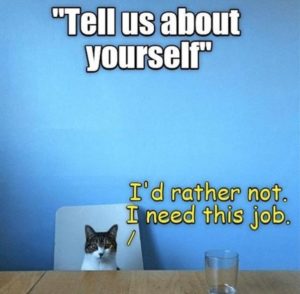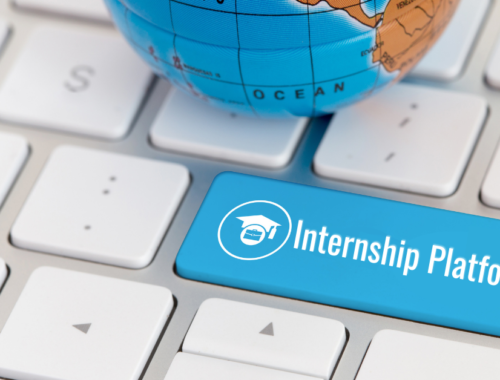
When the college’s finally over, what’s next?
After bagging that degree and selling your textbooks with BookScouter, the next step is to join the workforce. However, before that, you’ll have to pass a job interview, and unlike the exams you aced in school, its questions aren’t always predictable. If you want your job interview to be successful, you should put great effort into your preparation.
Depending on the job specifics and organization, preparation may involve not only going through the list of your strengths and weaknesses, achievements and failures, best skills and growth points but also through your college materials—and maybe even practicing old exam questions.
You can’t be 100% sure what you’ll be asked in a first job interview. However, we’ll lend you a hand and make your preparation easier. That’s right; we have the top 7 questions to expect during your first interview. And as a bonus, we’ve added the best ways to answer them.
- Tell Us a Little More About Yourself
- How Did You Hear About this Position?
- Why Do You Want to Work at this Company?
- Why Should We Hire You?
- How Do You Feel About Working in a Team?
- How Do You Deal with Working under Pressure?
- How Do You Aim to Deal with Multitasking
Tell Us a Little More About Yourself
This is the cornerstone of all first job interview questions. Unfortunately, most job seekers underestimate it and fail to use it to their best advantage.
The thing is that it’s absolutely natural for interviewers to want to know about you before you join them (in the office on not) on an everyday basis. They seek to understand whether you’re a good fit in every way, and it’s all on you to introduce yourself properly.
So, how do you answer?
The best approach is to start with the present. Talk about your current situation or career as well as any significant accomplishment. Then take them on a trip back in time and explain how you got to where you are. And finally, present an overview of what you aim to achieve with the role you seek.

![]() Example: “It all started at school when I realized I had a knack for creative thinking. I majored in English literature in college and aced my creative writing classes. I’ve recently managed to work my way from a college graduate to a part-time position in a small digital marketing agency. I’m also working as a freelance content creator at X Company in a marketing department. I aim to become a full-time content creator and help make your creative campaigns more successful.”
Example: “It all started at school when I realized I had a knack for creative thinking. I majored in English literature in college and aced my creative writing classes. I’ve recently managed to work my way from a college graduate to a part-time position in a small digital marketing agency. I’m also working as a freelance content creator at X Company in a marketing department. I aim to become a full-time content creator and help make your creative campaigns more successful.”
How Did You Hear About this Position?
Your interviewers will be curious to know how you heard about the available position. There are three options your answer can revolve around. They include a recommendation, recruitment, and personal search.
When your answer, be clear with details (e.g., always remember the name of the person who recommended you). Also, if you were recruited, you should explain why the job matches your ideals and goals.
![]() Example: “While browsing LinkedIn, I discovered that your company was hiring, and as I’ve followed your exciting projects’ progress since high school, I immediately decided to apply. Your goals align perfectly with my expertise and vision as well as research plans, and I’m positive that my skills are a perfect fit for the requirements of this job.”
Example: “While browsing LinkedIn, I discovered that your company was hiring, and as I’ve followed your exciting projects’ progress since high school, I immediately decided to apply. Your goals align perfectly with my expertise and vision as well as research plans, and I’m positive that my skills are a perfect fit for the requirements of this job.”
Why Do You Want to Work at this Company?
There has to be a reason you chose this company among all others in the industry. Indeed, you won’t be applying to a single company, but the interviewers at every one of them will be curious about your reason for applying exactly to them. Now, things could get tricky at this point because you don’t want to end up with the most obvious and generic answers.
You must aim to stand out, so do carry out proper research before heading for an interview. Make it clear what you truly want from this job and why the company is the best fit for you.
![]() Example: “I came across your LinkedIn position description where you’re looking for “creative and broad-minded content creators to help with our brand expansion. “First, I admire how your campaigns established your company as a household brand. I want to be a part of a team that makes things happen. Second, I am inspired by how you center your plans on young minds and innovative thinking because creativity and innovation make every project exciting for me. I get bored when things have to be done conventionally. Finally, you focus on sustainable energy resources specifically, and I’ve been doing my summer internship in the marketing team of the renewable energy department, so I’ve got experience in this sphere.”
Example: “I came across your LinkedIn position description where you’re looking for “creative and broad-minded content creators to help with our brand expansion. “First, I admire how your campaigns established your company as a household brand. I want to be a part of a team that makes things happen. Second, I am inspired by how you center your plans on young minds and innovative thinking because creativity and innovation make every project exciting for me. I get bored when things have to be done conventionally. Finally, you focus on sustainable energy resources specifically, and I’ve been doing my summer internship in the marketing team of the renewable energy department, so I’ve got experience in this sphere.”
Why Should We Hire You?
Now that you’ve told them why you want to work here, the interviewers would like to know why they should pick you from the bunch. You highlight your passion for the role and how you’re a good fit.
![]() Example: “I find your project both exciting and challenging for the industry in general and personally for me as a young professional. I studied graphic design in college and worked in the content design field during my internship, so I’ve gained experience, and at the same time, I’m so eager for a challenge. This means I might be a great fit for this job, which, I suppose, requires great content visualization skills and a knack for boosting customer appeal.
Example: “I find your project both exciting and challenging for the industry in general and personally for me as a young professional. I studied graphic design in college and worked in the content design field during my internship, so I’ve gained experience, and at the same time, I’m so eager for a challenge. This means I might be a great fit for this job, which, I suppose, requires great content visualization skills and a knack for boosting customer appeal.
As an intern, I managed to become the one the managers turned to when they needed to get the job done no matter what. So I believe I can contribute a lot to your project.”
How Do You Feel About Working in a Team?
Before you answer this, you must research the principles and values of the company. Find out if they’re a team-driven organization or if they rely on the presence of individual talents coming together to make a difference. This will ensure you have the knowledge of the company’s culture and understand whether it aligns with the way you prefer to work.
![]() Example: “While I’m good at doing things independently, I’m also positive that several heads can accomplish a goal faster. I got this idea confirmed when I joined an efficient and smoothly-operating team during my last year’s internship at X Company. I was assigned to Product Team 1, where I learned how to do my own tasks fast and back up and get help from others—to get things done. I’m sure I’ll fit in well in your team, too.”
Example: “While I’m good at doing things independently, I’m also positive that several heads can accomplish a goal faster. I got this idea confirmed when I joined an efficient and smoothly-operating team during my last year’s internship at X Company. I was assigned to Product Team 1, where I learned how to do my own tasks fast and back up and get help from others—to get things done. I’m sure I’ll fit in well in your team, too.”
How Do You Deal with Working under Pressure?
Avoid the generics like “I’m stress-resistant.” No one will believe that, and besides, the interviewer needs to know how capable you are during challenging times because tough times can happen everywhere. Instead, give an example of how you’ve successfully managed to resolve a work-related situation while being under pressure. Here, you can also add your expectations and ask about the possibility and frequency of such cases.
![]() Example: “I’m perfectly capable of maintaining control and focus. While I haven’t yet had a full-time job to test myself, I had plenty of situations during my studies and part-time jobs where I had to work under pressure. For one thing, I combined my college schedule and part-time job hours to get the most out of it and stay effective at both. For another, I could stay on schedule at my part-time job during every peak sales season, successfully meeting all deadlines. However, I would prefer such situations to be a rare occasion rather than a typical workflow.”
Example: “I’m perfectly capable of maintaining control and focus. While I haven’t yet had a full-time job to test myself, I had plenty of situations during my studies and part-time jobs where I had to work under pressure. For one thing, I combined my college schedule and part-time job hours to get the most out of it and stay effective at both. For another, I could stay on schedule at my part-time job during every peak sales season, successfully meeting all deadlines. However, I would prefer such situations to be a rare occasion rather than a typical workflow.”
How Do You Aim to Deal with Multitasking?
This time, your time management and productivity are put to the test. The best way to answer this question is by providing an example of you maintaining composure while multitasking.
![]() Example: “In the past, multitasking was a challenge for me. At school, I could focus only on one thing at a time; however, it improved in college. I realized that doing one thing at a time hindered my progress, so I tried different approaches, and after a while, I got better at balancing different tasks. After an internship in a marketing agency, I can say that I became really good at distributing time to each task. For instance, I learned how to combine editing video ad content while creating an article without compromising performance. Now I can say that I can multitask quite effectively if I need to.”
Example: “In the past, multitasking was a challenge for me. At school, I could focus only on one thing at a time; however, it improved in college. I realized that doing one thing at a time hindered my progress, so I tried different approaches, and after a while, I got better at balancing different tasks. After an internship in a marketing agency, I can say that I became really good at distributing time to each task. For instance, I learned how to combine editing video ad content while creating an article without compromising performance. Now I can say that I can multitask quite effectively if I need to.”
Wrapping Up
There are many first job interview questions, but the above-listed ones encompass the major and most common questions. Therefore, you can use this article as a study guide for your first job interview. To get more tips, practice answering the most common questions, and get comfortable with the answers, check out the interview warmup—it’s also a great way to boost your confidence for that first job interview.
Feel free to check the article on how to make money while job hunting after college.



